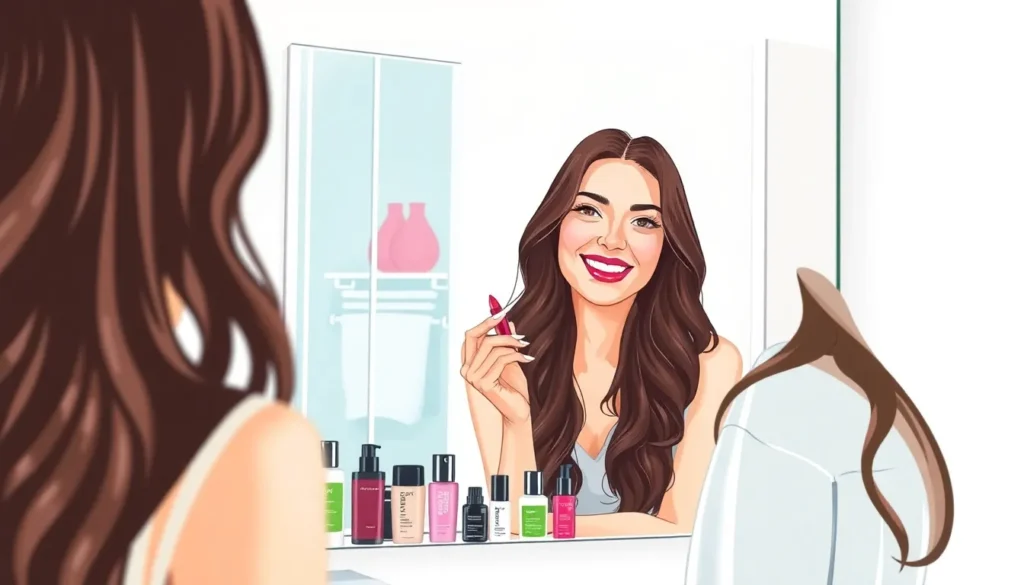Table of Contents
ToggleIn a world where beauty trends change faster than a cat video goes viral, staying updated on cosmetic innovations is crucial. From groundbreaking skincare formulas to jaw-dropping makeup technologies, the beauty industry never sleeps. It’s like a never-ending game of “What’s new?”—and trust us, you don’t want to be the last to know.
Overview of Cosmetic Innovation Updates
The cosmetic industry consistently introduces innovative products and technologies. Recently, brands focused on sustainable ingredients, attracting eco-conscious consumers. Skincare products now include advanced formulations with active ingredients like peptides and probiotics. Makeup technology has evolved, featuring long-lasting, lightweight options that cater to diverse skin tones.
New delivery systems enhance effectiveness. Microneedling devices and serums with improved absorption rates showcase this trend. Brands increasingly use biotechnology to develop potent formulations, often yielding visible results in shorter periods. Personalized beauty products are also gaining traction, utilizing AI algorithms to tailor skincare to individual needs.
Emerging trends spotlight clean beauty movements. Consumers prefer products free from harmful chemicals, prompting companies to reformulate existing lines. Transparency in ingredient sourcing remains a priority, with brands highlighting ethical and cruelty-free practices.
Digital platforms play a significant role in promoting these innovations. Social media influencers often highlight the latest trends, driving consumer interest. Many brands leverage augmented reality to provide virtual try-ons, offering interactive shopping experiences. Data-driven marketing strategies enhance consumer engagement, allowing brands to tailor messages effectively.
Investments in research and development ensure continuous advancement in cosmetic formulations. Collaboration between beauty brands and dermatologists results in more scientifically backed products. This synergy fosters trust, encouraging users to explore new offerings. As a result, staying updated on these innovations ensures consumers can make informed choices aligned with their preferences.
Recent Trends in Cosmetic Products

Keeping up with cosmetic industry trends reveals innovative shifts in product formulation and consumer preferences. Recent updates emphasize natural ingredients and sustainable practices.
Natural and Organic Ingredients
The demand for natural ingredients has surged, with consumers leaning towards products featuring plant-based components. Research indicates that formulations featuring organic elements support skin health without harmful chemicals. Brands are evolving their products to include botanical extracts, essential oils, and nutrient-dense ingredients. Peptides and probiotics emerge as popular additions, enhancing skin function and texture. Many companies leverage these organic materials to promote clean beauty initiatives, aligning with consumer values for wellness and safety. Future product lines will likely focus on transparent sourcing and ethical production processes.
Sustainable Packaging Solutions
Sustainability extends beyond ingredients; packaging innovations gain traction. Many brands adopt eco-friendly materials, reducing plastic waste in the beauty sector. Refillable packaging offers consumers a practical way to minimize their environmental footprint. Companies are increasingly exploring biodegradable and recycled materials to enhance their sustainability efforts. Research confirms that consumers prefer brands committed to environmentally responsible packaging solutions. Collaborative efforts among beauty brands aim to establish industry standards for sustainable practices. As consumer expectations shift, investment in sustainable packaging will likely influence product development.
Technological Advancements in Cosmetics
Technological advancements drive innovation in the cosmetics industry, enhancing product personalization and user experience.
AI and Personalization
AI revolutionizes beauty product recommendations, creating tailored experiences for consumers. Algorithms analyze skin types and concerns to suggest personalized skincare regimens. Brands like Proven Skincare utilize data-driven insights to formulate products that meet individual needs. Customization extends to makeup as well, with companies offering shade matching based on unique customer attributes. This shift toward personalization reflects a growing consumer desire for products that cater specifically to their skin health. Brands leveraging AI not only boost customer satisfaction but also build strong loyalty through these tailored solutions.
Augmented Reality in Try-Ons
Augmented reality (AR) transforms how consumers interact with cosmetics by enabling virtual try-ons. Applications allow users to experiment with various makeup looks without physical products. Companies like L’Oréal and Sephora use AR technology to provide immersive experiences, helping customers visualize how products will appear on their skin. Users can choose from multiple shades and styles, increasing confidence in purchase decisions. This integration of technology supports consumers in exploring new looks while reducing the risk of buyer’s remorse. Enhanced AR tools facilitate convenience and accessibility, reshaping traditional shopping experiences in the beauty industry.
Emerging Brands and Their Innovations
Many emerging brands are leading the charge in cosmetic innovations. Brands like Ilia Beauty focus on clean formulations, using sustainably sourced ingredients that align with the clean beauty movement. New skincare lines often incorporate botanical extracts, ensuring consumers receive products that prioritize natural components.
Personalization plays a significant role in brand development. For instance, companies such as Atolla utilize AI technology to formulate serums tailored to individual skin needs, enhancing consumer satisfaction. Another example includes Function of Beauty, which allows consumers to customize hair care products based on hair type and personal preferences.
Sustainability remains crucial for new brands. Packaging innovations reduce plastic waste, with brands like Meow Meow Tweet offering refillable options that promote eco-conscious choices. Data shows that consumers increasingly favor brands that emphasize environmentally responsible practices.
Technological advances also reshape the landscape of beauty. AR technology has revolutionized shopping experiences, enabling virtual try-ons for makeup products. For instance, brands like Fenty Beauty provide tools that allow users to visualize how products will look on their skin tones, making purchasing decisions easier.
Emerging brands continuously adapt to market demands, reflecting consumer trends toward wellness and safety. Transparency about ingredient sourcing and product formulation builds trust with consumers, fostering loyalty and encouraging brand advocacy. As these innovations unfold, the cosmetic industry evolves, aligning itself with the preferences of a more informed consumer base.
Market Impact of Cosmetic Innovations
Cosmetic innovations significantly reshape market dynamics within the beauty industry. The surging demand for natural and organic ingredients reflects a broader shift in consumer preferences. Many consumers now favor products containing botanical extracts, essential oils, and nutrient-rich components that enhance skin health. Brands prioritize sustainability by adopting eco-friendly materials and refillable packaging options, aligning with consumer values regarding environmental responsibility.
Technological advancements also drive notable market changes. AI creates tailored product recommendations, revolutionizing how consumers discover skincare solutions. Brands like Proven Skincare effectively utilize data insights to meet unique customer needs. Customization extends to makeup, allowing personalized shade matching based on individual attributes.
Augmented reality offers an innovative avenue for consumer engagement, enhancing shopping experiences. Virtual try-ons enable users to experiment with different looks without the commitment of purchasing physical products. Companies such as L’Oréal and Sephora successfully implement AR technology, fostering greater consumer confidence in purchasing decisions.
Emerging brands highlight market adaptability by focusing on clean formulations and sustainably sourced ingredients. Such companies prioritize transparency in ingredient sourcing, which builds trust and loyalty among consumers. Ilia Beauty stands out for its commitment to delivering clean beauty products, while Function of Beauty emphasizes the need for personalization in hair care.
As these trends unfold, they play a crucial role in shaping the future of the cosmetics industry. Enhanced consumer awareness influences brand development, driving a collective movement toward wellness and safety. Industry standards for sustainability are increasingly established as brands collaborate to meet evolving consumer expectations.
The landscape of the cosmetics industry is evolving at an unprecedented pace. Brands are not just responding to consumer preferences but actively shaping them through innovative practices. The emphasis on sustainability and personalization is transforming how products are developed and marketed.
As technology continues to advance, the integration of AI and augmented reality is enhancing the consumer experience, making beauty more accessible and tailored than ever. Emerging brands are leading the way in clean formulations and transparency, reflecting a growing demand for ethical practices.
These trends signify a promising future for the cosmetics industry, where wellness, safety, and environmental responsibility will remain at the forefront of innovation.







